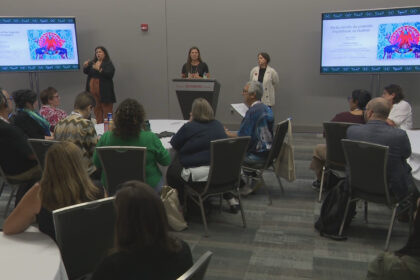TorontoA legislative committee studying the issue of intimate partner violence is preparing its final report, but NDP MPPs say they can’t support it and, on Thursday, walked out of a meeting. Procedural rules prevent them from explaining in detail why they are withdrawing their support.NDP MPPs say they can’t stand by the committee’s report and will write their own dissenting versionMeagan Fitzpatrick · CBC News · Posted: Nov 21, 2025 3:57 PM EST | Last Updated: 33 minutes agoListen to this articleEstimated 5 minutesThe audio version of this article is generated by text-to-speech, a technology based on artificial intelligence.Kristyn Wong-Tam and other NDP MPPs issued a statement Thursday saying they were withdrawing from the provincial committee studying intimate partner violence to ensure the process has ‘integrity, accountability, and respect for survivors.’ (Spencer Gallichan-Lowe/CBC)The committee studying intimate partner violence at Queen’s Park has hit a mysterious roadblock.On Thursday, NDP MPPs walked out of the meeting, where work was underway on writing and reviewing its final report. These sessions are held in-camera, meaning they’re private and MPPs can’t disclose what happens behind the closed doors. The NDP members said they can’t explain in detail why they are abandoning the committee work but they issued a statement and read it to reporters after leaving the meeting. “Choosing to ensure that the process has integrity, accountability, and respect for survivors now requires that we withdraw from the government’s report-writing process,” said Kristyn Wong-Tam (Toronto Centre). “Survivors deserve to have their voices heard,” Wong-Tam said. “Ontario’s Official Opposition believes that we must now produce our own dissenting report to ensure that survivors’ voices and calls for change are heard.”Wong-Tam said the party didn’t make this decision lightly, and they’re disappointed and disheartened over how the study, which started in early 2024, played out. “We are removing ourselves. We cannot stand by that report,” Wong-Tam said.When asked for a response to the NDP’s action, Ravneet Gill, government house leader’s office spokesperson, said in a statement: “We owe it to the many victims and advocates who took the time to share their experiences with the committee to finish the study. Our government members will continue to do exactly that.”The study was launched after the NDP proposed Bill 173 in April 2024, which would require the Ontario government to recognize intimate partner violence as an epidemic. Calls for ‘epidemic’ declarationFront-line service providers, advocates and survivors have been pushing Premier Doug Ford’s government to make the declaration, arguing it would focus attention on what they call a crisis and public health emergency. Their hope is that the government would then swiftly dedicate more resources to support survivors and enact further measures aimed at violence prevention.The inquest that was held in Renfrew County following the murders of three women also recommended that intimate partner violence (IPV) be declared an epidemic.The government did not support calls to unanimously pass Bill 173 and instead struck a committee to study the issue and make recommendations. Its work was partly interrupted by the election called in late January. Wong-Tam said commitments by the government to allow the committee to travel to Renfrew and to rural, Francophone and Indigenous communities were not honoured. “That was a promise that was broken,” the MPP said, adding they feel the final report will not include certain voices.The committee did hear from 90 experts and 60 survivors, and received written submissions, according to debate in the legislature on Nov. 5.’Endemic’ versus ‘epidemic’During that debate, the associate minister of women’s social and economic opportunity said the draft report prepared for the committee recommends the province declare intimate partner violence “endemic” rather than “an epidemic.”Charmaine Williams said “endemic” is “the most accurate and appropriate way to describe the nature of intimate partner and gender-based violence.”“Endemic problems are persistent, predictable, and have deep roots in systems and structures. Epidemics, as we all know from COVID, are sudden, unexpected and marked by significant increases,” Williams said.WATCH | Intimate partner violence calls on the rise, OPP data shows:OPP data shows the number of intimate partner violence calls across Ontario is increasing Victim-focused organizations in eastern Ontario say the incidents they are seeing are more volatile. But they also say police are co-ordinating and responding better than ever before. She said calling the issue an epidemic “does not go far enough to acknowledge how deep-rooted and consistently present violence against women is.”Williams said using the term “endemic” does not amount to watering down the seriousness of intimate partner violence, and she blamed the opposition for prompting an argument over what word is most appropriate.The committee was scheduled to meet again next Wednesday. On Friday afternoon, a notice was issued indicating the meeting has been cancelled. It did not provide a reason for the cancellation. The final report is due to be released publicly by Dec. 10. The committee is planning on releasing it in English only first, with a French version to follow later. Top priority must be ending violence, advocate saysSami Pritchard, director of advocacy and communications at YWCA Toronto, said she hopes the final report accurately reflects the evidence and recommendations from survivors and organizations like hers that testified at committee. “Our top priority must be ending this violence — that goal has to rise above any partisan considerations, and we sincerely hope that every member of provincial parliament remains focused on that urgency and the life-saving objective,” Pritchard said in an interview.Calling IPV endemic instead of an epidemic would still indicate that action needs to be taken, said Pritchard, and that’s the main goal.“What we cannot lose sight of is why this work matters, and that is that Ontario is facing a crisis of intimate partner violence and lives are at stake.”ABOUT THE AUTHORMeagan Fitzpatrick is a multiplatform reporter with CBC News in Toronto. She joined the CBC in 2011 and previously worked in the Parliament Hill and Washington bureaus. She has also reported for the CBC from Hong Kong. Meagan started her career as a print reporter in Ottawa.
Wednesday, 4 Mar 2026
Canada – The Illusion
Search
Have an existing account?
Sign In
© 2022 Foxiz News Network. Ruby Design Company. All Rights Reserved.
You May also Like
- More News:
- history
- Standing Bear Network
- John Gonzalez
- ᐊᔭᐦᑊ ayahp — It happened
- Creation
- Beneath the Water
- Olympic gold medal
- Jim Thorpe
- type O blood
- the bringer of life
- Raven
- Wás’agi
- NoiseCat
- 'Sugarcane'
- The rivers still sing
- ᑲᓂᐸᐏᐟ ᒪᐢᑿ
- ᐅᑳᐤ okâw — We remember
- ᐊᓂᓈᐯᐃᐧᐣ aninâpêwin — Truth
- This is what it means to be human.
- Nokoma











